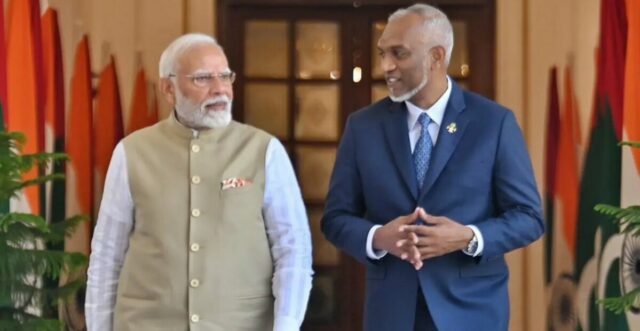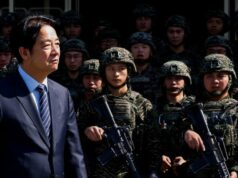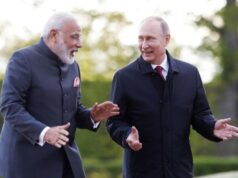
Maldivian President Mohammed Muizzu has completed the substantive part of his visit to India.
But even as the two sides explore the contours of a Comprehensive Economic & Maritime Security Partnership, it’s interesting to note how Muizzu defined it.
He said it covered development cooperation, trade and economic partnerships, digital and finance initiatives, energy projects and more.
The word security did not figure much less defence, which would be in keeping with his decision to remove all Indian military personnel from his country.
But he appeared to have no such inhibitions when he went to China in March and according to the Maldivian Defence Ministry, “Signed an agreement on China’s provision of military assistance gratis to the Republic of Maldives, fostering stronger bilateral ties.”
No details were provided other than China committing to provide free “non-lethal” military equipment and training to the island nation.
It’s not clear if Muizzu was forthcoming with his Indian hosts on the nature of the defence and security cooperation with China. India is seriously concerned about any agreement that strengthens Beijing’s foothold in the region and the broader Indian Ocean.
There’s another concern: the Indian intelligence establishment is of the view that “China and Pakistan’s interests are interchangeable. Where one goes the other follows, and both have an interest in undermining India.”
There was a time when Islamic radicalism had cast its shadow over the Maldives. In a population of about three lakhs, there were 150 Islamic radicals some of whom are said to have fought on the side of Osama bin Laden in Afghanistan.
Some died, some returned home while others were not allowed to return. But it only underscores the point that there is a constituency in the Maldives that Pakistan or China can tap to feed their anti-India agenda.
There is also the Habib Bank, Pakistan’s largest and perhaps best-known bank that has been operating in the Maldivian capital Male for many years. Habib Bank has a controversial record.
It was recently fined $225 million in the US for infringing laws designed to combat illicit money transfers, said a report in Dubai’s Khaleej Times. It is shutting its New York operations.
Two years ago, it came under the scanner of a New York District Court for aiding and abetting Al Qaeda terrorism. It was accused of helping customers evade international sanctions and conspired in attacks that killed or injured more than 300 people in Afghanistan between 2010 and 2019.
In 2016, a review by the New York authorities of thousands of transactions found that Habib Bank had processed payments to known criminals and sanctioned entities. In other words, HB can be (or already is) a tool to facilitate Pakistan’s agenda in the Maldives.
This is not to belittle the fact that Muizzu has come far from the seriously anti-India plank he adopted ahead of his election campaign last year. This marks his third visit to Delhi, coming at a time when Moody’s had downgraded his country’s credit rating, warning of “default risks”.
With foreign currency reserves down to $400 million, which covers less than two months of imports, Muizzu knows he’s in trouble and needs help. Being the closest neighbour, there’s much India has to offer.
But Muizzu needs to be forthcoming about his friends in Beijing, what he wants from them and what they want in return.
Thirty eight years in journalism, widely travelled, history buff with a preference for Old Monk Rum. Current interest/focus spans China, Technology and Trade. Recent reads: Steven Colls Directorate S and Alexander Frater's Chasing the Monsoon. Netflix/Prime video junkie. Loves animal videos on Facebook. Reluctant tweeter.




